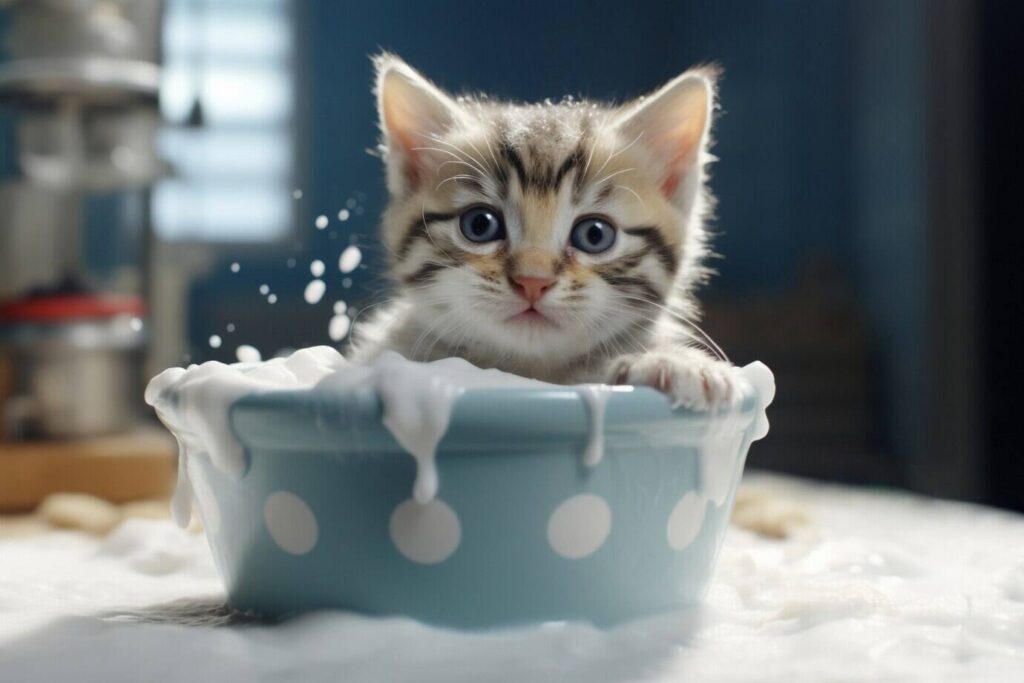
Cats are typically self-groomers, but sometimes they just have to be bathed. It’s during those times that the right soap becomes an important decision for the health of your cat’s skin and coat. We will cover best practices and products for the grooming of cats. We will also tell you important information about soap to wash your cat.
Why Regular Soap Isn’t Suitable for Cats?
Regular soaps and shampoos for humans do not treat cats properly because they strip the oils from their skin. It might cause dryness, irritation, or allergies. Ingredients like sulfates, parabens, and synthetic fragrances are also harmful to felines and can trigger respiratory problems or skin sensitivity. Always use only soap to wash your cat to avoid harming them.
Characteristics of Cat-Friendly Soap
When choosing the right soap to wash your cat, look for these core features:
- pH Balance: Cats have a skin ph. That is different from humans. Products designed for the pH of a feline help take care of the skin and prevent irritation.
- Hypoallergenic Ingredients: Soaps without strong chemicals, artificial dyes, and fragrances reduce allergic reactions.
- Moisturizing Formulas: Oatmeal and aloe vera are great ingredients that can be used to calm down and hydrate the cat’s skin, especially for cats with sensibility issues.
- Natural Elements: It is best to have a product made up of natural oils and plant extracts while keeping away harsh substances such as tea tree oil or citrus oil.
Soap Types for Cats
Some of the most recommended soap options for bathing cats:
- Cat-Specific Shampoos: These are specifically designed to meet the needs of a cat’s sensitive skin and coat.
- Waterless Shampoos: Ideal for cats that are afraid of water, these sprays or foams make for easy cleaning with no hassle of a bath.
- Oatmeal-Based Shampoos: Great for cats that have itchy or dry skin, oatmeal-based products both soothe and accomplish much.
- Homemade Soaps: Always an option of DIY, safe, natural ingredients are used, like castile soap, among others. Safety research is always required.
- Medicated Shampoos: For skin conditions or flea infestations, get medicated soaps through your vet that are suited to your pet’s needs.
Tips for a Stress-Free Bathing Experience
- Prepare the Environment: Use lukewarm water and keep everything you need within reach.
- Minimize Stress: Reward treats, speak calmly, and handle them gently.
- Rinse Thoroughly: Make sure all soap residue is rinsed from the skin to avoid irritation.
- Frequency: Cats generally do not require frequent bathing unless they have conditions affecting their skin or become exceptionally dirty.
Precautions for Soap to Wash Your Cat
- Do not use baby shampoos or dog products as they may not be formulated for cats.
- You should conduct a patch test on the new soap to see if there are any negative reactions.
- You should always consult with your vet before using medicated or specialty soaps.
Popular Soap to Wash Your Cat
Some of the popular brands would be:
- Earthbath: Its formulas are natural and biodegradable.
- Burt’s Bees: Hypoallergenic and gentle grooming products.
- Vet’s Best: pH-balanced, vet-approved.
Alternatives to Bathing
If the cat refuses to be bathed, other options include pet wipes, cleaning with a damp cloth, or dry shampoos. These methods can be applied to clean a cat without causing too much stress.
The best soap and the right grooming can contribute a lot to making your cat feel more comfortable and healthy. Do not forget the specific needs and reactions of every kitty and have a positive experience.
For more details on product recommendations and other advice, check with your veterinarian or a reliable veterinary source.

Safe Soap to Wash Your Cats
Most cats are independent which makes them dislike bathing, but there are special circumstances that call for bathing. Selecting the correct soap form is usually very important for your cat’s well-being and ease. Here’s what you need to know about safe soaps for cats:
Opt for Cat-Specific Soaps
The only safe option is special soaps intended for pet cats. It also means they will be pH-balanced for the skin of a cat and will not contain some catastrophic ingredients. Some include Espree Natural Silky Show Cat Shampoo and Burt’s Bees.
Natural Soaps Containing Essential Oils
That is why natural products may seem so much better. Most of them contain essential oils, which we know are fatal to cats. Essentials such as tea tree, peppermint, and citrus are poisonous to cats. Since they cannot metabolize such substances leading to, drooling, vomiting, and liver failure.
Emergency Alternatives
In emergencies, one can use a non-irritating soap such as the unscented baby shampoo or castile wash though this should only be used sparingly. These ones are milder than the traditional soaps and more within the pH level that is safe for cats.
Avoid Overuse of Dish Soap
Scented dish soap is not suitable for removing oil or skunk smell. Some scented soaps cause cat skin irritation due to the removal of skin natural oils.
Waterless Shampoos and Wipes
Most cats are not big fans of water; hence, premoistened wipes and waterless shampoos are godsend. Some products like the Wahl Pet-Friendly Waterless No Rinse Shampoo are hypoallergenic. They have a balanced PH and the fragrance is mild such that cleaning the pet is very fast and safe.
When in Doubt, Consult a Vet
Never use flea shampoos or any other soap to wash your cat that are not developed or intended for felines and never use flea shampoos for kittens, pregnant, or nursing cats.
Even when a bath is inevitable, the right products will keep your cat clean, healthy, and happy throughout the process.
Why Cat Needs Washing?
As you know cats are very independent and can groom themselves, but some situations require the cat to be bathed. Here are some common reasons your cat might need a wash:
Removing Hazardous Substances
There is always a chance that substances like motor oil, grease, or dirt will stick to the coat of a cat. If these could be toxic, they must be washed off, so as not to be ingested during grooming activities. Consult your vet if you have any doubt as regards the substance.
Health Conditions Which Influence Grooming
Some cats may hardly groom themselves due to obesity, arthritis, or dental diseases. It may inflict severe pain on the cats; therefore a bath may occasionally be necessary.
Preparing for Cat Shows: Soap to Wash Your Cat
Performing cats need particularly clean fur that looks good enough for competition.
Skin Conditions or Parasites
Pets with skin problems, allergies, or flea infestations may require medication that comes in shampoo form prescribed by the vet.
Forgetting of Odours or Sticky Organisms
If your cat once comes across something that is stale or emits an awful stench, a wash is the answer.
How to Wash a Cat Fast?
As you would expect, felines dislike water just as much as you dislike having a shower; therefore, bathing a cat is not easy at all. Here’s a step-by-step guide to make it easier:
- Preparation: All necessary supplies should get into the place and the person performing the extermination should put on protective clothing.
- Set the Mood: Spray pheromones or play some music before or during the stage.
- Prepare the Bath Area: Having a sink up to the middle of the thigh and using a towel at the bottom to have a good grip is the most appropriate.
- Trim Nails: This helps avoid scratching which is always a big issue when one is handling fruits or veggies.
- Secure Your Cat: Cup your hands lightly to avoid them fleeing from you.
- Wet the Fur: Wash with warm water, not on the face.
- Apply Soap/Shampoo: Rub on the fur and then wash out thoroughly.
- Clean the Face: In sensitive areas use a damp cloth.
- Dry Thoroughly: Pat dry with a towel and, if it can be stood, use a low-heat dryer.
- Reward: Make sure that all the doggies’ treats are favorable so as to make sure that all the doggies associate the visit with positive things.
Products That Act As Safe Soap For Cats
If you don’t have cat shampoo on hand, these substitutes can work in emergencies:
- Plain Water: Good for washing that only contains minor dirt particles but can only remove grease and strong smell.
- Pet Wipes/Baby Wipes: As sure as they are water-based they must not be scented.
- Unscented Baby Shampoo: It can be used from time to time.
- Dawn Dish Soap: Oily resonant and good for oils but should be used judiciously.
- Mild Soap: Just make sure it doesn’t contain essential oils since they are fatal to cats.
Substances to Avoid
Skip using dog shampoos containing parasiticides, or essential oils, vinegar excluding when the vet has recommended it, and sanitizing wipes as they are likely to cause discomfort to a cat’s sensitive skin or are toxic.
Conclusion
While a walk or a game of fetch with a ball is a very common activity that you do every day. The same cannot be said for bathing a cat for instance. It will be needed in situations where the cat has certain health complications, has come into contact with certain chemicals, or for occasions like beauty contests. It is, therefore, advisable to use a safe soap to wash your cat and follow these steps so that the cat does not get stressed up when being groomed. Remember, safety and comfort are always the main priorities when considering everything related to the cat and contact a vet if necessary.
FAQs
Unfortunately, it is not advisable to use human shampoos on cats, because the skin pH differs for cats and human beings and can cause skin rash and dry skin. In emergencies, use cat shampoos or mild products such as unscented baby shampoos to clear the skin of your cat.
Few cats need to be bathed often so this is therefore good to remember. Bathe your cat only if the cat has dirty fur, cannot groom it, or has a condition that requires special bathing.
For an independent cat, who categorically refuses to take a bath, use baby wipes or periodically wipe the cat’s body with a wet cloth. For chronic problems, bathe them take them to a grooming specialist, or consult your veterinarian.




